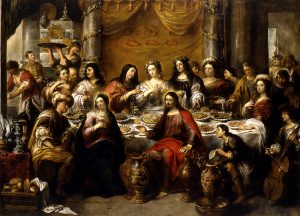Today we are celebrating the 2nd Sunday after the Epiphany. This mass that we offer reminds all of us that we constantly respond to an invitation to renew our minds and hearts with humility, which excludes self-importance in our relationship with others. We must be faithful to discharge our duties to contribute to the greater good of our community and the whole Church.
In today’s epistle from the letter of St. Paul to the Romans, Paul illustrates the different gifts we have received and the different ways to use them. These gifts are extraordinary and supernatural which God bestowed freely to the person without receiving them on account of personal merits, like prophecy, ministry or service, teaching, exhorting, giving, mercy etc. These gifts are not for personal spiritual advantage but for the benefit of the whole Church. God gives with fairness, and one should be content with the gift he has received and not desire that of another. The word here, “with simplicity,” means not seeking one’s own interest, but only the welfare of his neighbor for God’s sake. St. Paul also mentioned the word, “Charity,” which is the excellent gift of God to our soul. It means that our brotherly love among ourselves should prompt us to be eager to exhibit mutual signs of respect. Our own interior life must shine through our own external demonstrations of our actions. St. Augustine animates that spirit of investigating and knowing our interior life with much fervor.
The gospel today narrates to us the first miracle of Jesus at the wedding at Cana. Jesus took advantage of that ordinary wedding occasion, though having second thoughts, but it was an opportunity to act, to perform a miracle to provide wine. The miracle was a sign.
There are reflection points we must consider understanding the message.
First, the occasion of the miracle happened in Cana of Galilee. The mother of Jesus was there, and Jesus, together with His disciples, was also invited to the wedding. Many of the other miracles of Jesus took place along the way to Jerusalem. This event was an unplanned wedding party just like an ordinary event; however, Mary, the Mother of Jesus, was there simply engaged in life and saw the need of that moment.
Second, the wedding needed more wine and so the family needed an intervention to free themselves from embarrassment. Therefore, they needed help. Mary, the mother of Jesus, came to Him expressing the unexpected problem. During that time, the wedding feast celebrations lasted for seven days according to Jewish custom. Mary simply says to Jesus, “They have no wine.” She expected Him to do something.
However, Jesus seems to be rejecting his mother’s desires, when He commented, “My hour has not yet come.” In the heart of His Mother Mary, she knew that Jesus was the Messiah. Doing something would provide a good opportunity to announce His own identity, but the timing of His revelation of His Messianic identity was an internal struggle for Him.
Third, the performance of the miracle was an outcome of Jesus seeing the problem and providing a concrete solution. Jesus told the servants to “Fill the waterpots with water.” They quickly obeyed. Then Jesus said, “Draw it out now, and take it to the headwaiter.” Once again, the servants obeyed. They drew some of the liquid out of the waterpots, put it in a smaller vessel, and took it to the headwaiter, who tasted it. John says, he “tasted the water which had become wine.” The miracle had happened! However, the headwaiter did not know that a miracle had taken place. He did not know where the wine came from. The servants did, but he did not.
Fourth, the significance of the miracle. This story should challenge us to believe in the Lord and to give Him glory. Clearly, miracles provide a witness, I guess, and all the guests were in awe by the consistency of the good wine. Jesus performed a miracle in obedience to His mother, who did not understand that the final glorification of her son would come through His death, burial, and resurrection.
Brothers and Sisters, Jesus meets our needs. We must be obedient like the wedding waiters because a miracle may still be needed, but we must do what He asks. We often pray for financial needs, cure of an illness, seeking counsel from Him, but we need to listen carefully and let the Holy Spirit guide you into knowing a course of action that will produce a result for you. Have we listened carefully to what the Lord is telling us? When Jesus answers our prayers, we often are surprised by both the quality and quantity of His provision. He came that we might have “abundant life.” Jesus is present to sustain us. Begin listening now!
God bless you.
Fr. Arlon, osa

